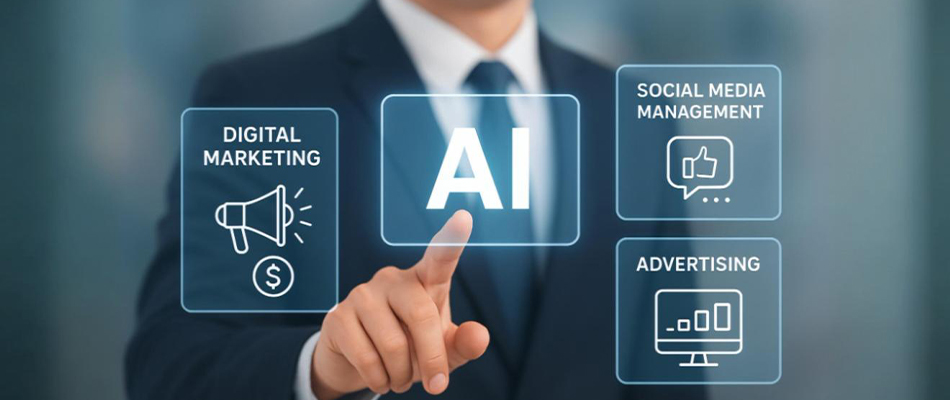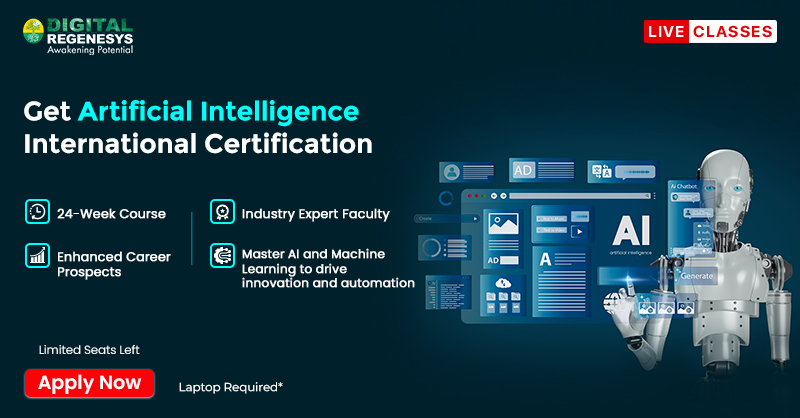How AI is Transforming Digital Marketing?

Artificial Intelligence (AI) is changing how businesses reach and serve customers online. It helps firms understand behaviour and act on insights faster than before. AI analyses data and finds patterns that humans may miss.
Marketers use these findings to personalise offers, automate tasks, and measure results. The result is more relevant messaging and better return on investment.
AI brings new tools and new responsibilities. In this article, we look at how AI changes digital marketing. We cover key uses, tools, risks, and where the field is heading.
7 Ways AI is Transforming Digital Marketing
Artificial Intelligence is reshaping how businesses connect with their audiences, making marketing more data-driven, personalised, and efficient. From analysing customer behaviour to predicting future trends, AI tools allow marketers to craft highly targeted campaigns that deliver measurable results.
By automating repetitive tasks and providing deeper insights, AI frees up teams to focus on creativity and strategy. These advancements are enabling brands to stay competitive in a rapidly evolving digital landscape. The following are the seven ways AI is transforming digital marketing.
1. Personalised Customer Experiences
AI uses data to create personalised experiences at scale. It looks at browsing, purchase history, and interactions. Then it predicts what a user may want next. Personalisation can increase engagement and loyalty. It also makes customers feel seen and understood.
For brands, this means higher conversion rates and better lifetime value. Personalisation works across email, web pages, apps, and ads. It relies on clean data and clear privacy choices.
This makes personalisation a core strength of AI in marketing.
- Product Recommendations: Suggest products that match a user’s tastes.
- Dynamic Content: Change website content per visitor in real time.
- Targeted Emails: Send messages that fit customer intent and stage.
- Adaptive Landing Pages: Show offers based on referral source or history.
- Journey Orchestration: Tailor interactions across channels for one customer.
Read more – How to Start Studying Artificial Intelligence?
2. Smarter Content Creation
AI accelerates content production while maintaining quality. It can draft headlines, product copy, and short articles. It can also propose creative angles and formats to test. For video and imagery, AI tools help edit and assemble clips quickly.
Marketers use AI to scale content for many segments and languages. AI is not a replacement for human creativity. Instead, it handles routine work, freeing teams to focus on ideas that require human judgment.
This shows how AI supports creativity while saving time.
- Draft Generation: Produce initial drafts for blogs and ads.
- Headline Suggestions: Test multiple headline options quickly.
- Visual Tools: Auto-edit images and make social clips.
- Language Localisation: Translate and adapt copy for markets.
- Content Testing: Run A/B tests on variations suggested by AI.
3. Data-Driven Decision Making
AI turns raw data into clear signals for marketers. It can predict which customers are likely to make a purchase. It can also show which channels perform best. Marketers gain timely insights, not just end-of-month reports.
Decisions on budget, channel mix, and creative can be evidence-led. This reduces waste and enables teams to respond to market shifts quickly. However, it depends on effective tracking and robust data governance.
This makes campaigns more accurate and measurable.
- Predictive Models: Forecast future customer actions from past data.
- Attribution: Identify which touchpoints drive conversions.
- Real-Time Dashboards: See performance as it happens.
- Automated Insights: Get alerts on trends and anomalies.
- Optimisation Suggestions: AI offers steps to improve campaigns.
4. AI-Powered Chatbots and Customer Support
AI chatbots handle many routine customer contacts. They answer FAQs and guide users to the right pages. Chatbots allow instant replies at any time. They also capture leads and basic details for the sales team.
Human agents then focus on complex or sensitive cases. Good design makes chatbots feel helpful, not robotic. Monitoring and training keep them effective over time.
This highlights how AI boosts service and efficiency.
- Instant Answers: Reduce response time for common queries.
- 24/7 Support: Provide help outside office hours.
- Lead Capture: Gather contact details automatically.
- Contextual Replies: Use past interactions for better responses.
- Escalation Rules: Hand off to humans when needed.
Get insights on Why Study Artificial Intelligence?
5. Predictive and Targeted Advertising
AI refines who sees ads and when. It analyses behaviour to score likely buyers. Ad platforms use these signals to bid and place ads. This improves return on ad spend. It also enables teams to test audiences and creatives more quickly. Still, success relies on clear goals and correct measurement. Mis-specified objectives can waste budget even with AI.
This demonstrates how AI enhances ad accuracy and efficiency in terms of spend.
- Audience Scoring: Rank users by conversion likelihood.
- Lookalike Models: Find users similar to top customers.
- Bid Automation: Adjust bids based on predicted value.
- Placement Optimisation: Choose high-value sites and formats.
- Creative Personalisation: Serve bespoke creative per segment.
6. Visual and Voice Search Marketing
AI enables new search methods beyond typed queries. Customers now use voice assistants and images to find products. Marketers adapt by optimising for these formats. Voice SEO focuses on natural phrases and local intent. Visual search needs clear tags and high-quality images. The shift changes discovery paths and purchase journeys for many shoppers.
This illustrates how AI is reshaping product discovery and search.
- Voice-Friendly Content: Use natural language for queries.
- Image SEO: Label images for visual search engines.
- Visual Commerce: Let users shop from photos and screenshots.
- Smart Assistants: Integrate offers with Alexa and Google Assistant.
- Voice Ads: Create short audio-first ad experiences.
Know more about Types of Machine Learning in Artificial Intelligence.
7. Marketing Automation with AI
AI improves automation beyond scheduled tasks. It can decide when to send a message and which content to include. Workflows become adaptive. Campaigns change in-flight based on customer action. Teams gain back time to build strategy and creative work. Proper setup and governance ensure that automation aligns with the brand tone and adheres to legal regulations.
This makes marketing simpler and less prone to error.
- Adaptive Email Flows: Send messages based on individual signals.
- Smart Scheduling: Post when followers are most active.
- Lead Scoring: Prioritise sales outreach by intent.
- Cross-Channel Orchestration: Sync messages across email, apps, and ads.
- Automated Testing: Run multivariate tests with minimal effort.
Ethical Concerns in AI Marketing
AI can help, but it can harm if misused. Poor data practices risk customer privacy. Bias in models can lead to unfair targeting. Marketers must be transparent about their use of AI. They must secure consent and protect data. Clear governance helps build customer trust and reduces legal risk.
This reminds us to use AI responsibly in marketing.
- Privacy by Design: Build systems that respect data rights.
- Bias Audits: Check models for unfair outcomes.
- Explainability: Be able to explain AI-driven decisions.
- Consent Management: Ensure lawful use of personal data.
- Regulatory Compliance: Follow GDPR and local rules.

Future of AI in Digital Marketing
AI will continue to transform the way brands and customers interact. Expect more real-time personalisation and predictive offers. Creative tools will generate richer content with less effort. New formats, such as immersive shopping and augmented reality, will continue to grow.
At the same time, regulation and trust will shape how widely technologies are used. Marketers who combine tech skills with ethics will gain an edge.
Future trends to watch include:
- Hyper-Personalisation: Offers tuned to moments in a customer’s day.
- Generative Creatives: AI that crafts bespoke visuals and narratives.
- Omnichannel AI: Seamless experiences across devices and platforms.
- Explainable Marketing AI: Models that explain why decisions were made.
- Sustainable AI: Energy-aware models and responsible use practices.
Conclusion
AI is turning digital marketing into a more precise and creative discipline. It helps teams work smarter. It also opens new ways to serve customers. Learning AI skills is now essential for marketing professionals. Practising with real tools and projects matters more than theory alone.
Explore the Artificial Intelligence Certificate Course from Digital Regenesys to build practical AI skills for marketing.
Visit Digital Regenesys to see course details and begin your learning journey.
Last Updated: 1 October 2025
